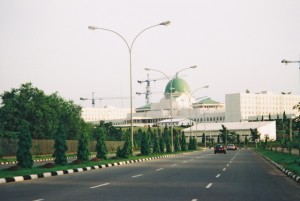“I had no idea it was this sweet to be a senator. Even an executive governor needs plenty of paperwork and approvals to raise money. As a senator, all you do is relax, and the money will come in, bag after bag. I should have come to Abuja earlier!”
This was the inadvertent confession of a former two-term governor, now a serving senator.
Of all people in the world, if former President Olusegun Obasanjo could say that ‘rogues and armed robbers’ were serving at the National Assembly, then there is serious cause for alarm. Of course, the vindictive Obasanjo may not have forgiven them for taking billions of naira to facilitate his third term bid only to thwart him. The truth, though, is that we do not need Obasanjo to tell us about rogues and armed robbers. We see them every day at the Three Arms Zone.
People who have gone to the National Assembly to defend their organization’s annual budget or to be screened for a federal appointment will testify to the monumental corruption that oils the process. Some legislators simply add a percentage to whatever federal agencies request – with orders to find a way to deliver the amounts to them when the funds are released. Others are too impatient to wait, so simply adopt a ‘pay before service’ approach to budgets or screenings. Any person or organization that wants a speedy passage must ‘perform’.
Legislators have turned the budget defence process into a subtle art. Some committee rooms have two entrances. Those that have ‘settled’ with the committee leaderships are ushered in through one entrance. These ones get easy questions and their budgets are quickly passed. Those that are trying to be ‘stubborn’ are ushered in through a different door, indicating that they have not ‘paid homage’. These ones are asked very tough questions and their budgets, no matter how well prepared, are rejected over and over, until they do their ‘homework’ and qualify to enter through the reserved entrance.
For some legislators, chairmanship or even membership of some committees is all important. They lobby to head or simply to be on specific committees, knowing that the returns will be juicy. Their so-called supervisory roles become mere opportunities to milk the ministries, departments and agencies they were supposed to oversee. When these contractor-politicians go out to solicit contracts, jobs, foreign tours and other favors, the legislation process becomes thoroughly compromised.
For instance, why has the Petroleum Industry Bill (PIB) not passed about four years of its submission? The answer is simple: the major oil companies, keen on preserving their interests at Nigeria’s expense, have reportedly built up a handsome revolving fund. At the slightest mention of the PIB at the National Assembly, some the money is released to the lawmakers and the bill promptly goes comatose. It is no wonder that even the diluted (and worthless) version of the PIB is yet to be passed.
The 360 members of the House of Representatives and 109 senators represent all the constituencies and senatorial zones of Nigeria. Our Constitution grants the National Assembly financial autonomy, so its budget is drawn directly as a first line charge. In 2011, these 469 people and their support staff cost Nigerians N150 billion. Every representative took home N28 million per quarter while every senator got N45 million per quarter under the guise of constituency projects, in violation of the modalities established by the Revenue Mobilisation and Fiscal Commission for the emoluments of public officers.
Our legislators are the highest paid lawmakers in the world. Despite the empty seats, inadequate preparation and inept approach to law-making, the average cost of maintaining a legislator is about N320 million per annum. In essence, every representative or senator who serves a complete four-year term will leave the National Assembly with an average of N1.28 billion richer. This is excluding the bribes, contracts and other illegitimate deals that the ‘dishonourable’ members and ‘extinguished’ senators have become synonymous with.
As long as vote-rigging remains the mainstay of our electoral system, neither the quality of governance nor legislation in Nigeria will improve. Of course, a few capable and upright legislators may exist, but the actions of many only reinforce the perception that the National Assembly is little more than a place to make money.
The odious allegations from the recent probe of the Nigeria Stock Exchange, pension fraud and the oil subsidy scam are only small apertures into the trading chambers at the National Assembly Nig. Plc.
Meanwhile, as we await the investigation into Hon. Farouk Lawan’s ‘subsidy-gate’, we must not lose sight of the bigger picture: the theft of N2.6 trillion – an amount that is over half of the federal government’s entire 2012 budget. Why should a confirmed $15 billion scam be overshadowed by a refuted $3 million bribe?
To put it colloquially, “we have captured a huge elephant. Why should we let it escape only to start chasing a small rat?”
